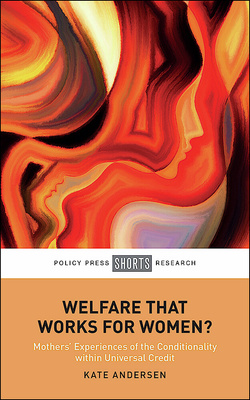Kate Andersen’s book Welfare that Works for Women incited the Rt Honourable Bishop Paul of Durham to ask three questions in Parliament in July 2023.
Bishop Paul raised his queries on the back of Chancellor Jeremy Hunt’s changes to the Universal Credit system, quietly introduced in his April 2023 budget. The changes require parents of three and four year olds to seek 30 hours of paid work, and actively discourages them, through the threat of financial penalties, from providing day-to-day care of their pre-schoolers.
Questions to Parliament
Welfare that Works for Women, published months before Hunt’s announcement, demonstrates the already damaging impact the original system of Universal Credit has had on the lives of women and their children. Under the original system, the lead carer with a youngest child aged three or four – the vast majority of whom are women – was mandated to find 16 hours of paid work or face punitive financial sanctions.
Armed with Andersen’s research, the Bishop asked to what extent the new policy had been assessed for its impact on families by increasing job search requirements for lead carers, as well as the impact of the government’s decision to introduce automated sanctions. His third question asked how the government was ensuring the work-related requirements were tailored to the caring responsibilities of the parents.
Andersen’s study, which included interviews with women on the receiving end of the system, revealed that contrary to government ideology, forcing women to find work did not improve their employment trajectories. Instead, stressed and anxious, the women found themselves taking on low-paid, gendered and precarious positions to meet the requirements of the policy.
Media interest
The Bishop of Durham is not alone in having access to Andersen’s research. Earlier in the year, Stephen Timms, Labour MP and Chair of the Work and Pensions Committee, committed to reading the book during the Easter recess.
“Against an increasingly punitive welfare landscape, it is important to see the research reaching the hands of people who are on the front line in creating and implementing policy changes,” says Andersen.
Media interest as the story broke at the end of April 2023 led to Andersen’s being contacted and interviewed by the Guardian and LBC Drivetime radio, and being invited by the Resolution Foundation to deliver a talk to further share her research.
Despite the evidence highlighting the negative impacts and consequences already in play with the current policy, the changes were implemented in October 2023, branded as an ‘employment boost for thousands of parents’.
Andersen is far from defeated by the lack of immediate revision to the policy, however.
“The evidence on the harm conditionality and sanctions cause is clear,” says Andersen, “and as we are likely entering an election year, this is an opportunity for all parties to consider how they might shape future policy decisions regarding women, work and welfare.”
Participant impact
Despite the situation worsening for many mums on Universal Credit, feedback about taking part in the research from the participants in Andersen’s study has been positive. Individuals have written to her to say how much they enjoyed taking part.
“There’s something about taking the time to listen to people who don’t often get the opportunity to talk about these things elsewhere. Importantly, the policy recommendations in the book came from the participants. They appreciated my sharing their ideas rather than coming up with my own proposals.”
Andersen is currently preparing for the next phase of her research to investigate the impact of the new policy changes. She hopes to be able to reengage with the original group to deepen the level of understanding about the ramifications of decisions made in Whitehall on the lives of those families at the sharp end, living out the reality the policies create.
Rebecca Megson-Smith is a writer and writing coach, founder of Ridley Writes. Kate Andersen is Research Associate in the School for Business and Society at the University of York.
 Welfare That Works for Women? By Kate Anderson is available here for £45.00 on the Bristol University Press website. Bristol University Press/Policy Press newsletter subscribers receive a 25% discount – sign up here.
Welfare That Works for Women? By Kate Anderson is available here for £45.00 on the Bristol University Press website. Bristol University Press/Policy Press newsletter subscribers receive a 25% discount – sign up here.
Follow Transforming Society so we can let you know when new articles publish.
The views and opinions expressed on this blog site are solely those of the original blog post authors and other contributors. These views and opinions do not necessarily represent those of the Bristol University Press and/or any/all contributors to this site.
Image credit: Benjamin Manley on Unsplash


